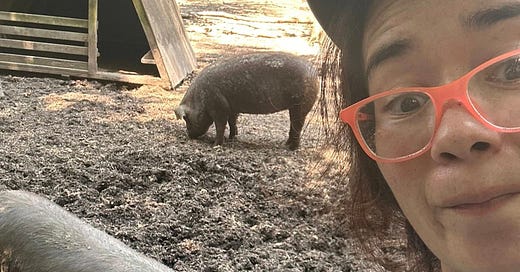I’m working on a pig farm now.
I moved back to Maryland with some plans to get a job quickly. Something simple, anything that would hire me.
Except I didn’t want to work anywhere that would slowly kill me.
And I didn’t want to work somewhere that didn’t interest me at all.
I also don’t ever want to go back to serving tables, which is something I kind of always thought I could return to.
I applied to the post office, Hobby Lobby, and at least four departments inside Home Depot. No responses.
Many days were spent scanning the job listings on indeed dot com til my head slowly compacted itself.
I had an opportunity to do real estate but it wasn’t quite right yet. Even joining a Jiu-Jitsu felt like I’d be staying stuck in the past.
I resent resumes. I resent how it feels like no human will have any idea of who I am in online hiring these days. Having a resume that is mostly Jiu-Jitsu probably doesn’t help me here.
What I wanted:
Job that didn’t kill me
Job that didn’t feel like actively participating in killing the planet or making things worse
A couple hundred bucks a week
I started thinking about people and communities I wanted to get to know. I wanted to meet people who are into seeing spirits, and regenerative farmers. (This line of thought also got me into a weekly meditation group).
“Dad, do you want to come to the farmer’s market with me? I want to see if there is anybody I want to work for there.”
Elysium’s truck was visible from the church parking lot of the rather small market that happens every Tuesday in Salisbury, Md.
I had almost no money at this point but still we wandered around the vendors first. I bought an apple and enjoyed seeing my dad start idle conversations with strangers selling coffee.
We reached the pig stand and I got to ask about his pastures (most small-scale pig farms doing humane practices do silvopasture, meaning the pigs are in the woods with room to rut and wallow). Together Bob the farmer and I told dad about the research done on White Oak Pastures down in Georgia showing how regenerative farming sequesters carbon rather than produces it through a combination of animal inputs and resting the land.
“A Life Cycle Assessment (LCA) study done by a Quantis, a third party sustainability science firm, found that White Oak Pastures offsets more than 100% of their cattle greenhouse gas emissions and 85% of the farm’s total carbon emissions. That means they are storing more carbon in the soil than their cows emit in their lifetime (carbon negative) and are, step by step, getting close to a carbon neutral operation overall. Quantis analysis included enteric emissions (belches and gas) from cattle, manure emissions, farm activities, slaughter and transport, and carbon sequestration through soil and plant matter. Because White Oak Pastures has been acquiring and converting land to holistic practices over quite a long time, they were also able to do soil sampling and model data from a number of different ecosystems in different stages of the regenerative journey. Some of the most exciting news is that in 2017 White Oak Pastures sequestered 919 tons of CO2 in the soil and their grassfed beef had a carbon footprint 111% lower than conventional beef.”
To me, this is like the best way ever to find a job.
I looked, eye to eye, at the man at the farm stand and said, “Hey, do you own this farm?” We shook hands firmly.
“Yes.”
“Do you ever need any help?”
“Sometimes!”
He handed me his business card and we decided that email would be the best way to contact him. I wrote a little about myself, hit send, and Bob called me while I was volunteering at a local lavender festival the next Sunday.
I’ve since been trained by two 16-year-olds (one much more than the other), a big ol farm boy named Billy, and by Bob himself, working to help grow greens, ferment grains, and feed fodder to 14 paddocks with 1 to 9 very happy-looking pigs in them. I have been electrocuted twice (so far) by the low wires running around the paddocks. ::shudder::
From their website:
“We pasture our hogs in the woods where they have the space to be the animal God and nature intended, and able to express the behaviors they're built with. We have enough space that manure breaks down naturally, enhancing the quality of our soil. My sons own a tree service, and we amend all of our pastures with the wood chips from their business.
This does several things: One, the hogs root and mold it to their desires. Two, while it breaks down its sequestering carbon. Three, it allows us to build high spots for placing their houses, and giving them dry areas to eat and rest.
Everything we do is to have happy, contented animals that never know stress in their lives.”
I’ve learned that I can view these animals compassionately and still see them as future food. A relief, since I’ve never taken the responsibility of killing the food I eat in my life and I do not wish to be naive about that.
My father does not have the same taste in food as I do but he still noticed that the fat that came off of Elysium bacon looked “so clean!”
Pigs and chickens are monogastric animals, like us, meaning that they have one stomach, and therefore a much shorter digestive system than ruminant animals like cows and sheep who possess much higher complexities of inner bacteria and self-fermentation to turn food into protein/muscle.
For that reason, a change in the food quality for a monogastric animal matters a lot more to the end product of the meat, and definitely the fat, that it produces. They are made from better-quality stuff and have a better-quality internal chemistry with fewer stress hormones and fewer medical treatments.
Pigs and chickens that are raised with a good diet and freedom to move will produce a vastly different meat than conventional factory farming. The joints on a pastured chicken have much more connective tissue because the animal exercised more, which means better bone broth for you and me.
No one is allowed to throw animal bones out around me. They must be broth-i-fied.
The meat from these more carefully/naturally raised animals tends to be darker than animals kept in small confined spaces. Their muscles are used more, have more bloodflow and firmer texture. Pastured chicken can be almost red.* Pastured animals have more flavor, which is sometimes off-putting to people used to conventionally-farmed blandness.
I cannot afford to eat only pasture-raised meat. I believe animals souls are on their own journeys, just like us. However, I do say a little prayer before eating to release any suffering the food on my plate endured and to feel gratitude for the lives that go into me going on living.
I have wished for years to be involved with regenerative agriculture and feel a part of something good for humanity and the planet. Working on the farm is an active job where I get exercise outdoors*** but no one wants me to kill myself trying either. There’s humanity in the workplace toward people and animals both. And expectations, sure. It’s not cushy, but I’m making a contribution to some animals lives that feels very right to me.
Thankfully Bob has a slaughterhouse that also treats the pigs well without unduly stressing them. He says, “A processor can ruin in minutes what I’ve taken care of for years.” Many small farms in the U.S. have problems with this as major slaughterhouses have monopolies that often create problems for anybody trying to buck inhumane trends. You can read one farmer’s account here, or investigate the PRIME act here. The documentary Sacred Cow also covers this raging problem for small-scale humane farmers as well as many crucial facts-based arguments for animal welfare and human meat consumption.** OMG I just discovered that it’s on YouTube for free!
*I acknowledge that breed selection also plays a role in what the meat is like.
**I wish everyone to pick and choose the diets that affect them best for their lives.
***I am getting SO MUCH foot exercise with my minimalist boots that I wear every day on all this uneven ground!
I also wanna shout out the only moisturizer I use regularly and have for months before ever entertaining pig farming - my friend Melissa’s herbal lard-based lotions from her unbelievably ethically-run company Vellum St.
Which Sam do you like, pig Sam or dress-up Sam?





